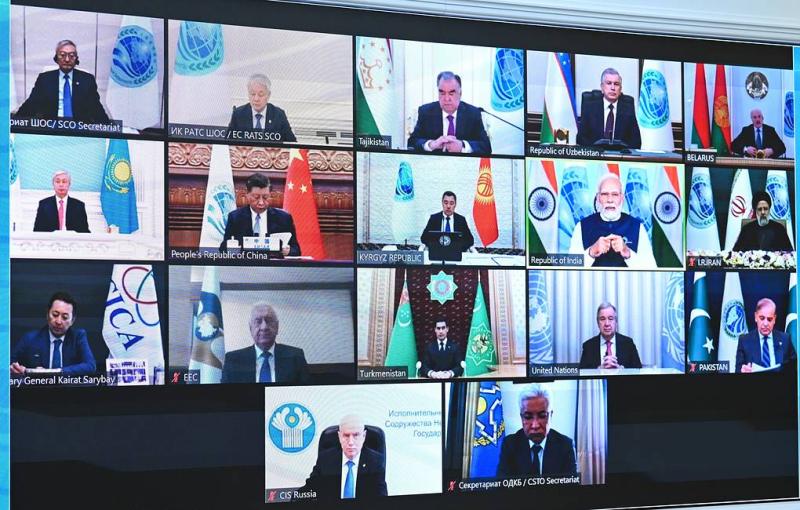
© Alexander Kazakov/POOL/TASS
New Delhi has hosted the 23rd SCO summit to finalize Iran's accession by its initial members — Russia, China, Kazakhstan, Kyrgyzstan, Tajikistan, Uzbekistan — along with India and Pakistan that joined in 2017. The status is also sought by Belarus and a number of major Global South countries like Saudi Arabia, Qatar, Syria, UAE, Myanmar, Nepal, Cambodia, etc.
The world’s growing interest in the SCO is understandable, as it gains influence and international authority. Suffice it to say that taken together, the SCO members embrace almost half of the world's population (3.4 billion people), over 20% of the planet's territory (34 million square kilometers), and a quarter of global GDP (more than $23 trillion) in 2022. At least four countries (Russia, China, India and Pakistan) have nuclear potentials. In this regard, analysts believe that it is the SCO along with BRICS (Brazil, Russia, India, China and South Africa) that acts as the key counterweight to the collective West as represented by G7 amid global pivot from unipolarity to multipolarity.
In addition to full-fledged Organization members, the New Delhi summit featured Iran, Belarus and Mongolia as observer states, and Turkmenistan as a guest of India the host. And the venue’s motto Towards a SECURE SCO was proposed by Indian Prime Minister Narendra Modi at a meeting of the Organization's leaders back in 2018.
Speaking about the current SCO summit, one cannot but to mention that despite the waived COVID-19 restrictions, it took place via videoconference, causing much gossip with the expert community and the media. Analysts and observers wonder why has India missed the chance to let the SCO leaders talk in person? The summit’s online format was reported by The Hindu newspaper a month before with reference to the Indian Foreign Ministry. With the latter itself failing to comment upon the decision, sources of the aforementioned outlet indicate that it was brought about by some "schedule issues ".
First, summit hosts got no confirmation on the arrival of certain leaders, including Chinese President Xi Jinping and Pakistani Prime Minister Shehbaz Sharif. The Ukraine war has also affected the format. Moreover, Narendra Modi himself was said to have recently been too busy traveling abroad. He has paid a state visit to the United States and plans to go to Paris on July 14, when the Bastille Day military parade is due.
Such arguments have unlikely satisfied hefty analysts who are setting out leads themselves. The only point they leave untouched is the conflict around Ukraine engaging many countries both in Europe and from across the globe. Another grave cause is high tension between New Delhi and Beijing. Indo-Chinese relations have not been in a good place for almost three years, but last year's SCO summit in Samarkand was attended by both Modi and Xi. One of the reasons for the waived face-to-face format is India's unwillingness to squabble with the key world countries over dissent concerning the Ukraine war. Experts are sure New Delhi seeks to maintain working relations with everyone, including the United States and Europe.
Whatever the case, it is not as if the SCO face-to-face summit was disrupted by a "third force". It was the choice of India itself, presumably with an eye to its own national interests. After all, this very kind of approach has been recently demonstrated by official New Delhi internationally.
And yet, the summit did take place and proved successful after all. The key achievement was the accession of such an influential Global South player as Iran, which is both beneficial to Tehran and the SCO itself, most experts tend to believe. Also, a decisive step was taken towards taking in Belarus. Notably, the process of admitting new members was accompanied by an expanded agenda. In particular, India, being the current SCO and G20 chairman, is confident that economic and food security issues have grown fundamental for the time being.
The summit saw SCO leaders also exchange views on acute global and regional issues. Russian President Vladimir Putin referred to a hybrid war waged against Russia, with conflict potential growing across the globe, making Russia feel stressed. "For a long time, external forces have been implementing a project near our borders to create from our neighbor, Ukraine, a de facto hostile state, an ‘anti-Russia.’ They funneled weapons into it for eight years, condoned aggression against the peaceful population of Donbass and indulged in every way in planting neo-Nazi ideology," he said. Now, according to Putin, amid the hybrid war against our country the SCO has played an increasingly significant role in international affairs with it "substantial contribution to maintaining peace and stability, ensuring sustainable economic growth of its member states and developing ties between peoples."
Following the summit, its participants adopted the New Delhi Declaration stating, among other things, that the SCO member states are not targeted against other countries, remain open to broad cooperation, and advocate respect for the peoples’ right to choose their own development path. "The member states <...> emphasize that the principles of mutual respect for sovereignty, independence, territorial integrity of states, non-interference in internal affairs and non-use of force or threats to use force, are the basis of sustainable development of international relations," the declaration clarifies.
In conclusion, let’s emphasize that the SCO 2023 summit has become a crucial milestone in boosting Eurasian unity in the face of disturbing patterns worldwide. This is especially true amid the growing conflict potential, as Vladimir Putin noted. Small wonder that the New Delhi Declaration included paragraphs on "new approaches" to both SCO performance and global issues.
The next meeting of the SCO Council of Heads of State will be held in 2024 in the Republic of Kazakhstan.









